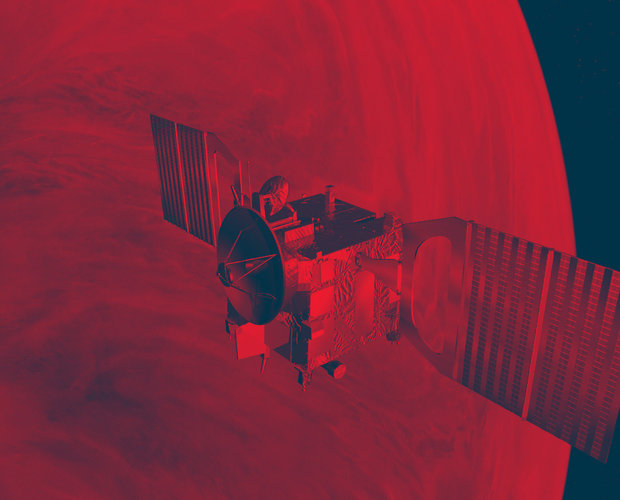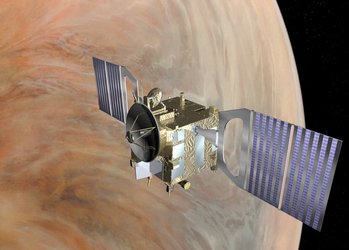Next stop Venus!
Follow the progress of Venus Express, ESA's next planetary mission to Earth's mysterious sister planet, on a new ESA web site, www.esa.int/venus.
Due for launch in October 2005, this mission will provide the most comprehensive study ever of the Venusian atmosphere.
It will dig into mysteries such as the unexplained fast atmospheric rotation in four days around the planet and the polar vortices.
It will study the global thermal balance and the role of the strongest ‘greenhouse effect’ found in the Solar System, as well as the structure and dynamics of the clouds and the mysterious ultraviolet markings detected above the cloud cover.

Venus is similar to Earth in terms of size and mass, but its surface temperature is about 460 degrees Celsius. This is hot enough to melt lead! The Venusian atmosphere is mainly made up of carbon dioxide, a 'greenhouse gas'. On Earth, carbon dioxide makes up only a tiny fraction of the atmosphere.
Why is there so much carbon dioxide in the Venusian atmosphere? What made Venus evolve so differently from Earth? Is Venus a mirror that reflects how the Earth will be if global warming continues at its current speed?

"Good questions. That is precisely one of the things we want to find out," says Hakan Svedhem, Project Scientist for Venus Express.
"Venus will help us understand what happens when the greenhouse effect is really extreme. However, it's not a good example of what will happen to Earth due to human activities. Life on Earth would disappear due to the extreme temperatures much before reaching even half of the concentrations of carbon dioxide on Venus!" said Svedhem.
Venus Express arrived at its launch site at the Baikonur cosmodrome, Kazakhstan, on 7 August. From now until the end of August, ESA and the industrial teams who built Venus Express will check again the integrity of all spacecraft systems and their functionality after the journey. Everything is on track for the launch of the European Space Agency's next planetary mission.















 Germany
Germany
 Austria
Austria
 Belgium
Belgium
 Denmark
Denmark
 Spain
Spain
 Estonia
Estonia
 Finland
Finland
 France
France
 Greece
Greece
 Hungary
Hungary
 Ireland
Ireland
 Italy
Italy
 Luxembourg
Luxembourg
 Norway
Norway
 The Netherlands
The Netherlands
 Poland
Poland
 Portugal
Portugal
 Czechia
Czechia
 Romania
Romania
 United Kingdom
United Kingdom
 Slovenia
Slovenia
 Sweden
Sweden
 Switzerland
Switzerland





























